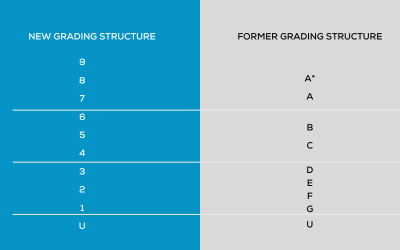With the GCSE dates due next week, many young students will be waiting in anticipation of the scores. It also brings with it for many employers (if you are like us) the question “what does that mean again?”.
Although the shift from the traditional A*-G grading system to the new 9-1 scale for GCSEs in the UK has left many employers still puzzled about what the grades are and how they translate to the old gradings. With GCSE results usually being a factor when evaluating Apprentices or fresh graduates entering the workforce, it is important to have a good understanding of the grading structure, but it is equally important to look beyond the grades when evaluating potential employees.
In this blog, we’ll give you a reminder of the grades and how they translate to the ones that many employers would have received themselves and offer practical tips on what to consider beyond the numbers.
The GCSE Grading System Explained

A grade 9 is the highest and most exceptional score, while grade 1 is the lowest. The goal is to provide a clearer distinction between the highest achievers.
Beyond Grades: Key Attributes to Look For
However, as is widely accepted now in the world with many examples of great business leaders who did not achieve any or very few GCSE grades (such as Richard Branson, Simon Cowell, Alan Sugar, David Karp to name just a few), it is important to look for other qualities in candidates beyond the academic grades. Here are some of the qualities you should be looking for and how you can assess them in an interview.
1. Problem-Solving Skills
While grades can indicate academic ability, they don’t always reflect how well a candidate can solve real-world problems. A book smart person isn’t always street-smart. Look for evidence of critical thinking and problem-solving skills in their experiences.
Example: During interviews, ask candidates about a time they overcame a challenge or solved a problem creatively. This can provide insights into their practical capabilities.
2. Communication Skills
Effective communication is important in any workplace. Assess how candidates convey their thoughts and ideas both in writing and verbally. Good communicators can articulate their understanding clearly, work well in teams, and handle customer interactions proficiently.
Example: Consider including a task that requires a written or verbal presentation to evaluate their communication skills directly.
3. Work Ethic and Attitude
A candidate’s attitude and work ethic often determine their success in a role more than their grades. Look for qualities like determination, resilience, and a positive outlook. These traits are indicative of someone who can thrive in various situations and contribute positively to your team.
Example: Ask about their extracurricular activities or part-time jobs. These experiences often reveal a lot about their commitment and work ethic.
4. Teamwork and Collaboration
Grades reflect individual performance, but most workplaces require effective teamwork. Assess how well candidates collaborate with others and contribute to group success. You need to spot candidates that could be good leaders and team players.
Example: Create an opportunity for the candidate to interact with the team they would be working with, for example, an office tour, a team lunch or maybe an offer to ask them to work a trial shift. Observe how they interact with your existing employees and look out for those who listen, share ideas, and support others.
Transferrable Skills: The Key to Unlock True Potential
In addition to grades, it’s essential to identify how candidates have pushed themselves to gain transferable skills. These skills often indicate a candidate’s ability to adapt, learn, and grow within your company.
Example: Look for involvement in clubs, sports, volunteer work, or any activities where the candidate has demonstrated leadership, time management, and initiative. These experiences often provide more insight into a candidate's potential than grades alone.
Adapting Your Recruitment Process
To ensure you’re considering the whole candidate, make sure you adapt your recruitment process to evaluate these attributes. Here are some practical steps:
- Behavioral Interviews: Make use of questions that assess behaviours and explore how candidates have handled specific situations in the past.
- Skill Assessments: Consider including tasks or tests that reflect the “real job” requirements to evaluate their practical skills.
- Trial Periods: Wherever possible, offer trial shifts or short-term trial periods to allow you to observe candidates in action and to assess their potential before committing to them long-term.
Take a look at your recruitment process to make sure it is really allowing you to assess the “whole candidate” not just their academic grades by having clearly defined job requirements, structured interviews, and activities that assess the key skills and attributes. By refining these steps, you can better identify the right employees who align with your company’s needs and culture.
Conclusion
Understanding the GCSE grading system is important, but as an employer, looking beyond the grades is equally important. By focusing on attributes like problem-solving, communication, work ethic, and teamwork, and recognising transferable skills, you’ll gain a fuller picture of each candidate’s potential. This approach will help you find the best fit for your team even if they are still don’t have actual work experience.
For more practical HR tips, guides, and updates, consider signing up for our email list to stay informed and up to date. If you have any questions or need expert HR consultation, call us at +44 (0)1233 627 275 or email us at hello@dakotablueconsulting.com.
